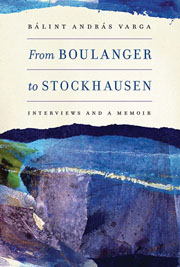Book contents
- Frontmatter
- Dedication
- Contents
- Foreword
- Acknowledgments
- Part One Interviews
- Preface to the Interviews
- Composers
- Georges Auric
- Alois Hába
- György Kurtág
- György Ligeti
- Karlheinz Stockhausen
- Conductors
- Instrumentalists
- Singers and a Record Producer
- A Teacher
- Music Administrators
- Snippets
- Part Two A Memoir
- Notes in Retrospect
- Index
- Miscellaneous Endmatter
György Ligeti
from Composers
Published online by Cambridge University Press: 05 January 2014
- Frontmatter
- Dedication
- Contents
- Foreword
- Acknowledgments
- Part One Interviews
- Preface to the Interviews
- Composers
- Georges Auric
- Alois Hába
- György Kurtág
- György Ligeti
- Karlheinz Stockhausen
- Conductors
- Instrumentalists
- Singers and a Record Producer
- A Teacher
- Music Administrators
- Snippets
- Part Two A Memoir
- Notes in Retrospect
- Index
- Miscellaneous Endmatter
Summary
Ligeti has left behind a sizable legacy for the reader as well as for the listener. His collected writings were published in two volumes running to 876 pages, one year after his death. They comprise his program notes on his compositions—a wonderful source of information for the musicologist, the concertgoer, and the CD collector. Also included are his admirable analyses of works by other composers, such as Boulez's Structures Ia, first published in 1958: an object lesson in erudition and clarity.
The innumerable interviews he gave over the decades have to be traced down elsewhere. He was an ideal interviewee, including when he was answering his own questions.
I did at least five interviews with Ligeti: one on his first visit to Budapest since his defection, in 1970, one for the Three Questions book in 1979, another one on his decoration with the newly created Bartόk–Pásztory Prize in Budapest in 1984 (I did a short report for Hungarian Radio; I remember his first sentence: “I was a Bartόk epigone”), and one each on his seventieth and seventy-fifth birthdays, in 1993 and 1998.
That first conversation, in 1970, was followed by an exchange of letters initially to do with the text (he made fifty-five comments and corrections) and in later years to report on his efforts to help me get out of Hungary. Ligeti's touching interest in my future sprang in part from his passionate rejection of communism.
- Type
- Chapter
- Information
- From Boulanger to StockhausenInterviews and a Memoir, pp. 26 - 57Publisher: Boydell & BrewerPrint publication year: 2013



